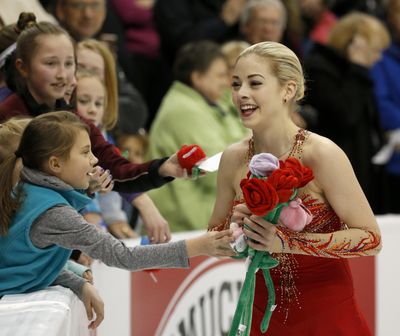Gracie Gold overtakes Polina Edmunds for second U.S. figure skating title

ST. PAUL, Minn. – Gracie Gold bounced back from a shaky short program with a flawless free skate to win her second U.S. title.
Gold trailed Polina Edmunds by 7.69 points coming into Saturday’s long program, but she landed seven triple jumps cleanly and earned high artistic marks to overtake the teenager.
Gold scored 147.96 points for a total of 210.46. The 17-year-old Edmunds had 137.32 points in her free skate for 207.51 total.
Three-time U.S. champion Ashley Wagner was cruising through her program with just one more jump to land when she did only one rotation of a planned triple lutz. In the end, those lost points didn’t matter – she would have finished third behind Gold and Edmunds even with them.
It was also a singled triple lutz that left Gold describing herself as “flummoxed” after her short program. But skating to “The Firebird” on Saturday, she fearlessly attacked each jump. When the final note had played, she threw her arms out and head back in triumph.
“It was almost better going in that way knowing I couldn’t miss anything,” Gold said. “I needed every single point. Every ounce of firebird I had needed to be left out there.
“And I did it.”
Edmunds, a 2014 Olympian seeking her first U.S. title, handled the pressure with poise but under-rotated one jump.
“I’m really happy that I put everything out and did exactly what I wanted to do in my head,” she said.
Earlier, new champions were crowned in ice dance and pairs, with siblings Maia and Alex Shibutani and Tarah Kayne and Danny O’Shea each winning their first national title.
The Shibutanis overtook defending champs Madison Chock and Evan Bates with a rousing free dance. They trailed by .47 points after the short dance but earned a standing ovation for their program Saturday to “Fix You” by Coldplay, receiving 115.47 points for 190.14 total.
“Having the crowd with us every step of the way meant everything,” Maia said.
Chock and Bates had 111.79 points for their free dance for a total of 186.93. Madison Hubbell and Zachary Donohue were third for the second straight year.
The Shibutanis won a world bronze medal in 2011 but had been unable to match that level of result since.
It has been a trying season for Chock and Bates, the 2015 world silver medalists, who have repeatedly changed their programs to try to contend in the biggest international competitions.
Kayne and O’Shea took the ice last, just needing to skate cleanly. Cautious but calm, they did what their rivals couldn’t and clinched a lopsided win with a record score.
They earned 142.04 points for the long program for 211.65 total, the highest mark ever at nationals, beating defending champs Alexa Scimeca and Christopher Knierim.
Kayne and O’Shea led after the short program, and when Scimeca and Knierim made several mistakes, the title was there for the taking.
Skating to “The Music of the Night” from “The Phantom of the Opera,” Kayne and O’Shea had the day’s only clean program among the contenders.
“Each element was easy, and the program flowed very effortlessly,” Kayne said.
Knierim fell on their side-by-side triple toe loops, and Scimeca had two feet down on one throw jump and both hands down on the other. They scored 129.45 points in the free skate for 196.80 total.
Marissa Castelli, who won two U.S. titles with former partner Simon Shnapir, was third with Mervin Tran with 179.04 points. The Americans have two spots at the world championships.
Kayne had hip surgery in July 2014, and she and O’Shea had to take off that Grand Prix season. They still managed to finish third at last year’s U.S. Championships, missing out on a spot at worlds.
When the scores were announced, Kayne burst into tears, and O’Shea alertly reached over to hand her a box of tissues.
The two have been skating together for under four years, an eternity for American pairs skating. Earlier this season, Scimeca and Knierim became the first U.S. pairs team to qualify for the Grand Prix Final since 2007, offering hope that the fortunes of American pairs skating might finally be reversing.
They struggled there, though, and again at nationals. Scimeca and Knierim completed their signature quadruple twist to open Saturday’s program, but then the mistakes started coming.